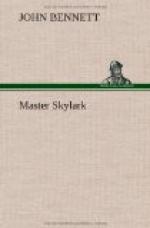CHAPTER XXXVIII
A STRANGE DAY
There in the Great House garden under the mulberry-trees stood Master Will Shakspere, with Masters Jonson, Burbage, Hemynge, Condell, and a goodly number more, who had just come up from London town, as well as Alderman Henry Walker of Stratford, good old John Combe of the college, and Michael Drayton, the poet of Warwick. For Master Shakspere had that morning bought the Great House, with its gardens and barns, of Master William Underhill, for sixty pounds sterling, and was making a great feast for all his friends to celebrate the day.
The London players all clapped their hands as Nick and Cicely came up the garden-path, and, “Upon my word, Will,” declared Master Jonson, “the lad is a credit to this old town of thine. A plucky fellow, I say, a right plucky fellow. Found the lass and brought her home all safe and sound—why, ’tis done like a true knight-errant!”
[Illustration: “MASTER SHAKSPERE MET THEM WITH OUTSTRETCHED HANDS.”]
Master Shakspere met them with outstretched hands. “Thou young rogue,” said he, smiling, “how thou hast forestalled us! Why, here we have been weeping for thee as lost, strayed, or stolen; and all the while thou wert nestling in the bosom of thine own sweet home. How is the beloved little mother?”
“I ha’ na seen my mother,” faltered Nick. “Father will na let me in.”
“What? How?”
“My father will na have me any more, sir—saith I shall never be his son again. Oh, Master Shakspere, why did they steal me from home?”
They were all crowding about now, and Master Shakspere had hold of the boy. “Why, what does this mean?” he asked. “What on earth has happened?”
Between the two children, in broken words, the story came out.
“Why, this is a sorry tale!” said Master Shakspere. “Does the man not know that thou wert stolen, that thou wert kept against thy will, that thou hast trudged half-way from London for thy mother’s sake?”
“He will na leave me tell him, sir. He would na even listen to me!”
“The muckle shrew!” quoth Master Jonson. “Why, I’ll have this out with him! By Jupiter, I’ll read him reason with a vengeance!” With a clink of his rapier he made as if to be off at once.
“Nay, Ben,” said Master Shakspere; “cool thy blood—a quarrel will not serve. This tanner is a bitter-minded, heavy-handed man—he’d only throw thee in a pickling-vat”
“What? Then he’d never tan another hide!”
“And would that serve the purpose, Ben? The cure should better the disease—the children must be thought about.”
“The children? Why, as for them,” said Master Jonson, in his blunt, outspoken way, “I’ll think thee a thought offhand to serve the turn. What? Why, this tanner calls us vagabonds. Vagabonds, forsooth! Yet vagabonds are gallows-birds, and gallows-birds are ravens. And ravens, men say, do foster forlorn children. Take my point? Good, then; let us ravenous vagabonds take these two children for our own, Will,—thou one, I t’ other,—and by praiseworthy fostering singe this fellow’s very brain with shame.”




